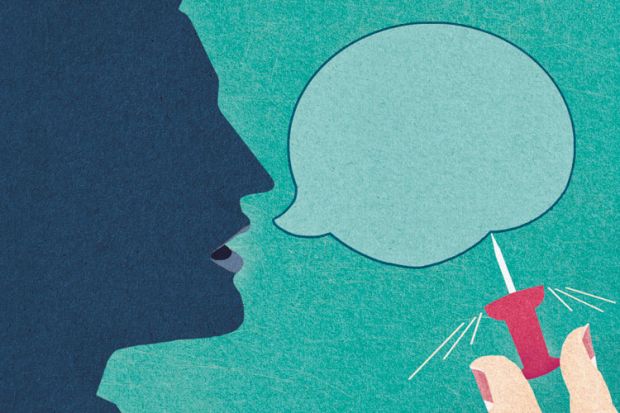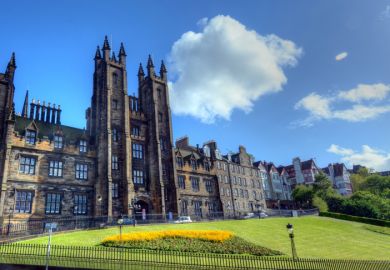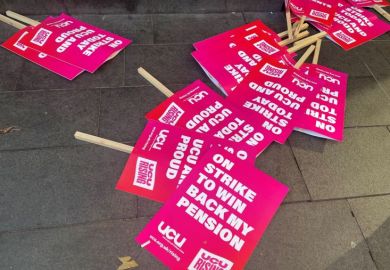Source: Marcus Butt
Last month’s sacking of two members of staff by the University of Bolton for allegedly leaking information to the press will be seen by many as yet further evidence that academic freedom is under attack.
The sackings come in the wake of press stories about expensive awaydays to a lake where Bolton’s vice-chancellor, George Holmes, moors his yacht and the revelation that the university lent Holmes nearly £1 million to help him buy a house. According to the University and College Union, the charges against one of the academics include “leaking information to the press aimed at damaging the university, and bringing [it] into disrepute”.
This is only the latest in a series of high-profile cases related to academic freedom. Perhaps the most notorious was last year’s nine-month suspension of Thomas Docherty by the University of Warwick. The charges against the professor of English and comparative literature – of which he was acquitted in October – apparently included making “ironic” comments and using negative body language towards his head of department. However – although the university denied it – many believed that he had been targeted because of his strong criticisms of university management and higher education policy.
Academic freedom is about not just the independence of universities from external control, but also about the autonomy of individual academics from university authorities. In the UK and elsewhere, this is being eroded, with moves away from collegial forms of governance towards strategic management, if not micromanagement, of research and teaching.
However, there are sharply different interpretations of “academic freedom”. At one end of the spectrum, it may mean no more than the “freedom” to fulfil contractual obligations. As a 1925 editorial in The New Republic put it, “the professor who is hired to parse French sentences must stick to parsing”. At the other extreme, what is championed is the freedom to express views publicly on any matter irrespective of the consequences (which seems to be the position of the campaign group Academics for Academic Freedom), or the right to carry out research that risks breaking the law – as in the case of “place hacker” Bradley Garrett (“Access denied”, 5 June 2014).
That New Republic editorial was written in response to a more balanced view of academic freedom offered by the American Association of University Professors’ landmark Declaration of Principles on Academic Freedom and Academic Tenure. The declaration argues that academics must be seen not as employees but rather as appointees: analogous to judges, who are appointed by governments but are not required to follow their directions. The rationale for this is that academic work cannot involve simply obeying commands or following rules because it requires open-ended enquiry that may raise questions about commonsense assumptions or the views of powerful interest groups.
This interpretation of academic freedom distinguishes it from the right to free speech, albeit with some overlap. Despite having this right as citizens, most employees have little protection from sanctions if they openly challenge their employers’ policies – unless doing so can be shown to be in the public interest. In the past, the principle of academic freedom provided additional protection in this area, at least where the challenges were directly concerned with what is detrimental to pursuit of academic work. Such protection, however, seems to be shrinking.
A ruling earlier this year by the European Court of Human Rights apparently confirms this. As Times Higher Education reported (“Sacked scholar wins battle in Strasbourg”, 19 March), the judges ruled that a professor at a Latvian university had been unfairly dismissed after speaking out against alleged nepotism, plagiarism, corruption and mismanagement. The sacking had breached his right to freedom of expression, but the court also affirmed that employees owed their employers a duty of loyalty and discretion, and were entitled to disregard it only when doing so was in the public interest. There was no mention of academic grounds.
On this reading, if the sacked Bolton pair did leak damaging information to the press – which they strongly deny – any claim for redress would depend on the argument that Bolton’s spending amounted to the misuse of public funds.
The increasing threat to academic freedom was also borne out in another well-reported case: a blog posting written during last summer’s football World Cup by David Browne, a lawyer whose firm, SGH Martineau, advised Warwick in its action against Docherty. As readers of THE will know, Browne compared Uruguayan footballer Luis Suárez’s habit of biting opponents to the actions of high-performing but “insubordinate” academics. Although Browne later qualified his remarks in the face of criticism, his original point, it seems, was this: if an academic’s behaviour threatens to “damage their employer’s brand”, they should be punished.
Under any definition of academic freedom, that line of argument should be resisted. But equally, suggesting that academic freedom entails unlimited free speech is misconceived. It implies a claim to more freedom in this respect than ordinary citizens have. And it would also license academics to misuse their intellectual authority in areas beyond their expertise to support political causes.
There are undoubtedly very serious threats to academic freedom coming from fundamental changes to the governance of universities. But it is also endangered by extravagant claims on the part of its supporters. Without a coherent and well-founded defence, it will be lost.
Register to continue
Why register?
- Registration is free and only takes a moment
- Once registered, you can read 3 articles a month
- Sign up for our newsletter
Subscribe
Or subscribe for unlimited access to:
- Unlimited access to news, views, insights & reviews
- Digital editions
- Digital access to THE’s university and college rankings analysis
Already registered or a current subscriber? Login





